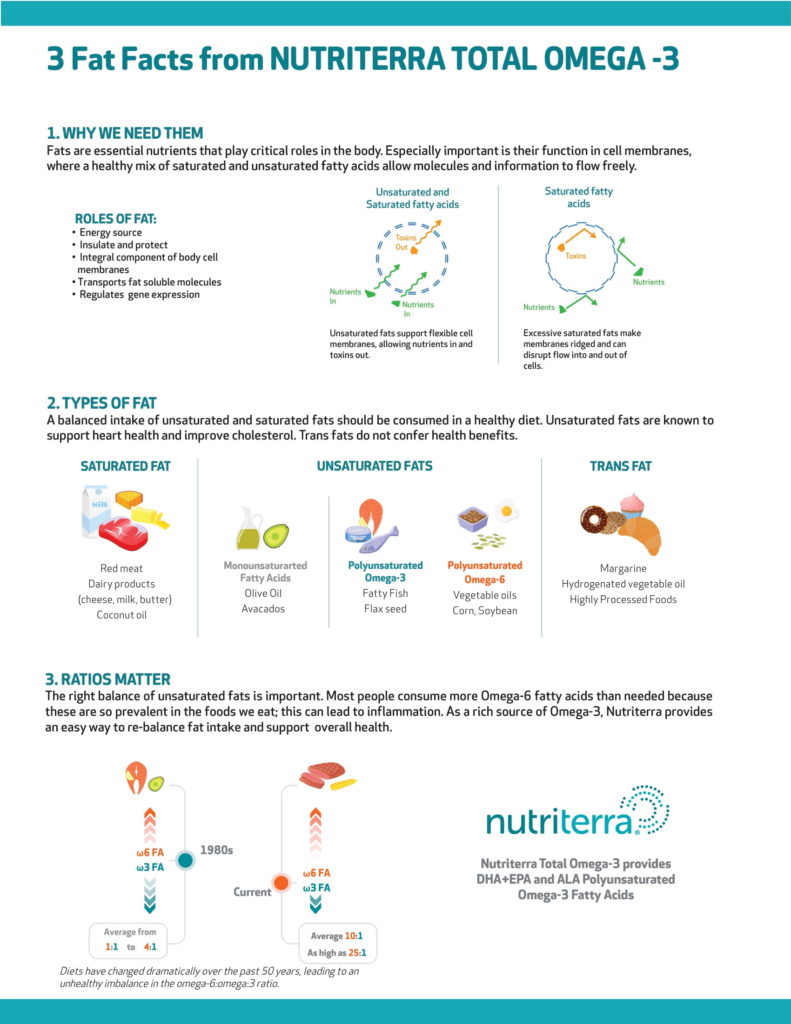Over the years, we’ve been bombarded with advice to choose low-fat or no-fat options, but then we see reports on the importance of consuming ‘good’ fats. According to recent consumer research from the International Food Information Council (IFIC), confusion about fats is a common struggle for many.
This infographic was designed to help simplify things and better communicate our current understanding about fats.

And here’s more on what you need to know about fats.
Fat is an essential nutrient in the diet.
Our bodies use it for energy and to make hormones and other molecules. It also insulates and plays a structural role in our bodies, protecting cells and organs. Fats are a critical part of the membranes that surround each cell. In this role, they allow nutrients to enter and toxins to exit. They also play another important role in our diet, by telling us when it’s time to stop eating.
These are just a few of the reasons as to why we should include fat in our diets.
There are several types of fats.
This is where confusion creeps in for people who are trying to improve their diets but hear mixed messages about whether they should eat fat and, if so, what types. To clarify, there are saturated fats, unsaturated fats and trans fats.
Saturated fats: Saturated fats are generally in foods from animals, particularly beef and poultry, as well as in dairy products.
Unsaturated fats: Unsaturated fats are largely found in plants, seeds, and nuts, as well as in fish and other seafood.
Trans fats: Processed foods, especially those which are made with hydrogenated or partially hydrogenated oil, may contain trans fats. This type of fat has been altered during processing and are associated with negative health consequences.
Both saturated and unsaturated fats play important roles in the body, but balance is key. In general, consuming less saturated fat from meat and dairy, while consuming more unsaturated fat from sources such as avocados, fish, and nuts, is considered healthy. Intake of trans fat, found in snacks and confections, should be minimized.
While unsaturated fats are considered healthier than saturated fats, some types of unsaturated fats are healthier than others.
Unsaturated fats can be further divided into monounsaturated and polyunsaturated. There needs to be balance in the types of polyunsaturated fats we consume. This is especially challenging because many of the vegetable oils in foods we eat are high in omega-6 and low in omega-3 polyunsaturated fats. Over the past few decades, our omega-6 to omega-3 ratio has become unbalanced, favoring fats rich in omega-6, to a degree that can contribute to inflammation.
Don’t be afraid to eat fat, just remember to make smart choices.
- Balance fat intake by consuming saturated fats in moderation.
- Choose foods and oils with more omega-3 and less omega-6 fats.
- Eat more fish or consider supplementing your diet with omega-3 oils to keep a healthy fat ratio.
Nutriterra® Total Omega-3 was designed to help rebalance your fat intake. Nutriterra oil is rich in omega-3 and lower in omega-6 fats to make it easier to consume a healthier ratio.